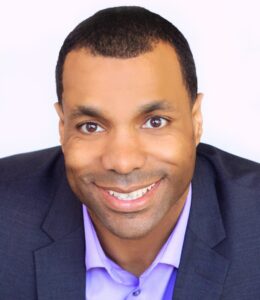 I became a Mental Health First Aid (MHFA) Instructor to address the mental health stigma that exists among Black men and to share what I learned with the faith-based community and to share with first responder. I have advocated for and compassionately responded to others for more than two decades. I’m grateful to share my story.
I became a Mental Health First Aid (MHFA) Instructor to address the mental health stigma that exists among Black men and to share what I learned with the faith-based community and to share with first responder. I have advocated for and compassionately responded to others for more than two decades. I’m grateful to share my story.
I am a husband, father of five children, community servant, son, brother and friend. I have responded to thousands of calls for service as an advocate, police officer and educator. I am also an Adverse Childhood Experiences (ACE) Interface Master Trainer, so I understand and can speak to, the effects trauma has on mental and physical wellbeing from childhood on.
I found MHFA earlier this year, when talking to a friend who’s an Instructor. Let me tell you, MFHA would have been useful when I was a new police officer more than 20 years ago! So many interactions were shaped by reactions to my uniform. I would have been able to approach those situations differently, or just have compassion, knowing things happen to people, maybe even been patient enough to listen nonjudgmentally. I might have also approached my own life with more compassion. I had more than a few spiritual lessons to learn, too.
As a child, I watched my mother raise four boys essentially by herself — struggling to feed us, keep us safe, clothe us, teach us, keep a roof over our heads and find a professional path. My mom was my point of reference spiritually and for dealing with life’s circumstances. As I saw her take on the weight of life – just adding, adding, adding – I watched, observed and imitated her as best I could.
And so I ignored warning signs while the compounding impact of responding to others manifested in my life as anxiety, depression and food addiction. I experienced uncontrollable shakes, anger, sadness and feeling all alone. I ate to numb my emotions and resentment. I practiced extreme self-reliance – after all, I was the solutions expert, a first responder. I frequently said to my confidants, “I am beyond exhaustion.” In truth, I felt as if I was suffocating. In spite of what I was experiencing, I kept on serving and gaining weight mentally and physically. And while it appeared like everything was all good and working out for me, behind closed doors, I was anything but OK.
It’s been a year, right? In 2020, we all faced the COVID-19 pandemic. On top of that, in May 2020, I experienced what I now refer to as a “divine disruption,” a wake-up call. My life turned upside down, and I didn’t know what to do or who to turn to. I went through a whole lot of anger, depression and forgiveness, all with the support of angels in my life.
I needed help. I was the trained first responder needing support. For the first time in my life I realized I didn’t know how to call for help or respond to my own needs.
My life was unmanageable, and I was powerless. I was seeking answers, but my pride affected every area of my life and served as a barrier to help. Life got worse because I was trying to troubleshoot, manipulate and solve my own problems. The turning point occurred when my faith in myself had run its course.
I turned to God, and I was given companions for support. A few of my spiritual learnings have been to accept life’s circumstances and understand my role in them, to surrender the meaningless and to rely on God.
Five months into my upside-down life, I was trained as a Mental Health First Aid Instructor. MHFA has given me tools to practice in my own life. These tools have helped me develop an awareness of the onset of challenges and to assess my needs, listen to my body and spirit, give myself what I require and to encourage myself. But self-care was just one lesson. My spiritual connection with God and MHFA have increased my empathy toward family, friends and strangers. Because of my training and my experiences, I assume we all have a personal story that manifests in our behaviors and impacts our mental health. I encourage people to seek support to identify their story.
A year since the divine disruption, my walk with God has become a way of life that’s resulted in peace, joy, serenity and hope.
MHFA taught me patience, and how to not diagnose. In MHFA, we teach how to be patient and be there for another person – without solving their problem. We gather information, assess the situation, listen nonjudgmentally and connect them with resources. We can give hope, with facts.
I see MHFA from the lens of a first responder, guiding me to be compassionately responsive with no judgment. We provide some resources – help them contact a family member, a friend or even social services. At the very least, we can see that they get to their destination. As an Instructor, I want to bring that understanding and those skills to my community.
I want people who are in crisis to know that the crisis isn’t their destination. There’s life beyond it — good life, great life.
[This article was part of our series for Mental Health Awareness Month.]